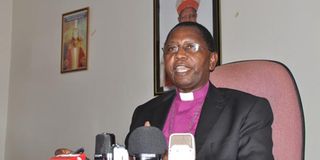Church of Uganda to boycott Anglican Summit over gays

In a confidential letter addressed to the bishops, clergy and other Lay leaders in the Church, Church of Uganda Archbishop Stanley Ntagali (pictured) indicated it had also been resolved by the Provincial Assembly that the Church province of Uganda “will not participate” in any of such conferences of the Anglican Consultative Council (ACC) until “Godly order is restored.” File photo
Kampala. The Church of Uganda has said it will boycott a top Anglican Church summit due in April in the Zambian capital Lusaka over failure by the top church leadership in Canterbury to disassociate itself from homosexuality that is threatening the moral fabric of the Church.
In a confidential letter addressed to the bishops, clergy and other Lay leaders in the Church, Church of Uganda Archbishop Stanley Ntagali on Tuesday indicated it had also been resolved by the Provincial Assembly that the Church province of Uganda “will not participate” in any of such conferences of the Anglican Consultative Council (ACC) until “Godly order is restored.”
The ACC is a periodical meeting aimed at facilitating the co-operative work of the churches of the Anglican Communion. The last meeting was held in New Zealand in 2012, while the next is due in Zambia between April 8 and April 19.
In the letter, a copy seen by Saturday Monitor, Archbishop Ntagali, also told the Church leadership that the beginning of 2016 found him “heavy in prayer for two burdens.”
“My first burden has been for our great country of Uganda, her leadership and her ongoing peaceful development. We have voted for our next President and Members of Parliament; local elections are also underway. I congratulate Ugandans for turning out in big numbers to exercise your right and responsibility to vote. This is a big step forward in our development as a democracy,” he stated.
The second burden in prayer, the Archbishop said, is the Anglican Communion whose “fabric” at the deepest level started tearing in 2003 when The Episcopal Church in America (TEC) elected as Bishop a divorced father of two living in a same-sex relationship –Gene Robinson.
“Not only was this a direct violation of the Bible, but it violated Resolution 1.10 of Lambeth 1998, which rejected “homosexual practice as incompatible with Scripture…and cannot advise the legitimising or blessing of same sex unions nor ordaining those involved in same gender unions.”
There was an emergency meeting of Primates of the Anglican Communion in the same year held in London, Archbishop Ntagali added, to try resolving the matter, to compel TEC not to proceed with the consecration of a gay bishop, but the efforts and resolutions put forward seem to have been “betrayed.”
“Thirteen years later, the Primates of the Anglican Communion gathered last month in January in Canterbury to discuss what to do about the fact that not only had TEC torn the fabric of the Anglican Communion at its deepest level in 2003, but they have since changed the definition of marriage to no longer be a lifelong union between one man and one woman.
In January, Archbishop Ntagali stormed out on the second day of the Primate’s meeting chaired by the Archbishop of Canterbury, England Justin Welby, citing moral differences. This was after he had moved a resolution requesting the Episcopal Church of America and the Anglican Church of Canada to “voluntarily withdraw from the meeting and other Anglican Communion activities until they repented of their decisions on homosexuality,” which has torn apart the Church but they demurred and Archbishop Welby seemed not committed to addressing the matter substantively.
At the meeting, the presiding Bishop for TEC Michael Curry, rather, stated that they would not change their position on offering “marriage” to same-sex couples.
“In other words, the Primates decision will have no impact on TEC,” Archbishop Ntagali noted. Primate is a rank bestowed on some archbishops in sections of the Anglican Church.
The spokesperson of the Church of Uganda, Dr Alison Barfoot, confirmed the letter to this newspaper and also added that there were “no ramifications” for boycotting the meeting.
The Anglican Consultative Council is merely a “consultative” gathering. It has no legal standing. The Church of Uganda is an independent and autonomous church within the Anglican Communion. This will also be the third Anglican Consultative Meeting that the Church of Uganda has not attended as a matter of principle,” Dr Barfoot said in an email. She said the decision not to participate in the official structures and meetings of the ACC was made by the church’s decision-making and governing body in 2010, and Rev Ntagali was therefore “simply re-iterating the position.”
Nigeria and Kenya are similarly considering boycotting the meeting, “although no decision has been taken yet.”




